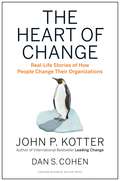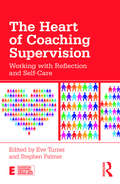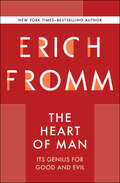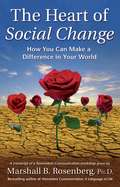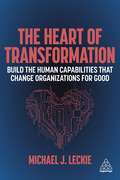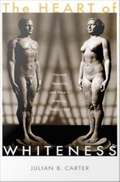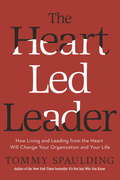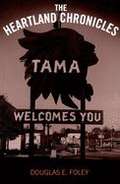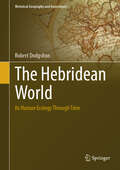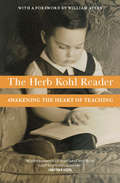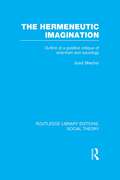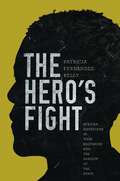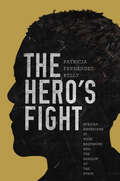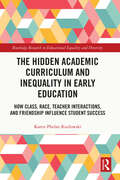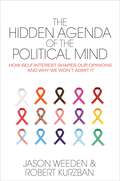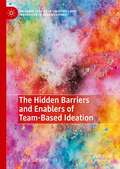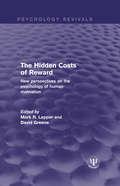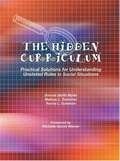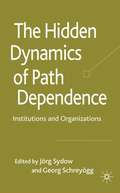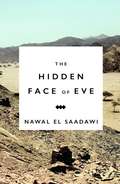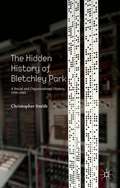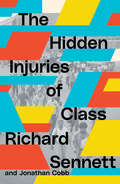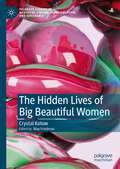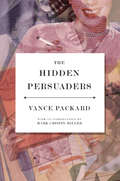- Table View
- List View
The Heart of Change: Real-Life Stories of How People Change Their Organizations
by John P. Kotter Dan S. CohenMoving beyond the process of changeWhy is change so hard? Because in order to make any transformation successful, you must change more than just the structure and operations of an organization-you need to change people's behavior. And that is never easy.The Heart of Change is your guide to helping people think and feel differently in order to meet your shared goals. According to bestselling author and renowned leadership expert John Kotter and coauthor Dan Cohen, this focus on connecting with people's emotions is what will spark the behavior change and actions that lead to success. Now freshly designed, The Heart of Change is the engaging and essential complement to Kotter's worldwide bestseller Leading Change.Building off of Kotter's revolutionary eight-step process, this book vividly illustrates how large-scale change can work. With real-life stories of people in organizations, the authors show how teams and individuals get motivated and activated to overcome obstacles to change-and produce spectacular results. Kotter and Cohen argue that change initiatives often fail because leaders rely too exclusively on data and analysis to get buy-in from their teams instead of creatively showing or doing something that appeals to their emotions and inspires them to spring into action. They call this the see-feel-change dynamic, and it is crucial for the success of any true organizational transformation.Refreshingly clear and eminently practical, The Heart of Change is required reading for anyone facing the challenges inherent in leading change.
The Heart of Coaching Supervision: Working with Reflection and Self-Care (Essential Coaching Skills and Knowledge)
by Stephen Palmer Eve TurnerThe Heart of Coaching Supervision takes us on a journey that starts with understanding who we are, and why we do what we do the way we do it, so that we can help those we work with understand themselves and their practice. The journey includes our background and personal and professional influences and considers the need for self-resourcing to resource others. It examines our being alongside our doing, to ensure that we can provide the best possible service to all those we work with. The book’s highly experienced contributors provide a unique perspective on supervision’s benefits. The chapters cover themes that support self-discovery and resourcing including the three Ps of supervision and coaching, diversity and inclusion, resourcing, working with intense emotions and the self as instrument. Nancy Kline’s Thinking Environment© is explored in a supervision context alongside creative forms of reflective and expressive writing and resourcing through a peer supervision chain. The Heart of Coaching Supervision also includes ten engaging, international case studies, considering the role of supervision in depth. A key contribution to the field, the book is essential reading for all coaches and mentors, coaching supervisors and psychologists, managers in a coaching role and anyone in a helping profession or leadership position wanting to better understand the wide benefits of supervision.
The Heart of Leadership
by Danilo Zatta Giovanni Battista VacchiSquarely aimed at leaders and aspiring leaders, The Heart of Leadership, written by two renowned management experts, presents practical examples and engaging insights to answer the key question of how to be a successful leader.This book reveals the key characteristics of a great leader and shows you how to develop the skills needed to motivate your team and overcome challenges. Leadership means successfully taking your place at the head of an enterprise and is both a shared journey and an adventure over the course of a career. Using an engaging and accessible style throughout, the book maps out how to achieve tangible results. It presents portrayals of some of history’s greatest leaders, from Gandhi to Steve Jobs, from Angela Merkel to Lisa Su, in order to inspire and help develop your own top leadership skills.This book is essential reading for CEOs, CFOs, HR managers, entrepreneurs, trainers, and those who are seeking a leadership position in an organization and want to understand how to succeed within it.
The Heart of Man: Its Genius for Good and Evil
by Erich FrommThe acclaimed social psychologist and New York Times–bestselling author of The Art of Loving discusses the nature of evil and humanity&’s capacity for it. Originally published in 1964, The Heart of Man was influenced by turbulent times. Average Americans were suffering from different forms of evil, including a rise in juvenile delinquency. On a grander scale, the threat of nuclear war loomed over the nation, and President John F. Kennedy had been assassinated. What could drive humanity to do things such as these? In The Heart of Man, renowned humanist philosopher and psychoanalyst Erich Fromm investigates man&’s capacity to destroy, his narcissism, and his incestuous fixation. He expands upon ideas he presented in Escape from Freedom, Man for Himself, and The Art of Loving, and examines the essence of evil, as well as the choice between good and evil. He also explores man&’s ability to destroy and further considers freedom, aggression, destructiveness, and violence. &“The Heart of Man questions human nature itself, from the forms of violence that plague it to individual and social narcissism to how the positive value of &“love of life&” can potentially outweigh the destructive &“syndrome of decay&” caused by the love of death and other harmful tendencies of thought.&” —Midwest Book Review
The Heart of Social Change: How to Make a Difference in Your World
by Marshall B. RosenbergThe tenets of Nonviolent Communication are applied to a variety of settings, including the classroom and the home, in these booklets on how to resolve conflict peacefully. Illustrative exercises, sample stories, and role-playing activities offer the opportunity for self-evaluation, discovery, and application. This insightful perspective on effective social change is illustrated with how-to examples.
The Heart of Transformation: Build the Human Capabilities that Change Organizations for Good
by Michael J. LeckieTechnology doesn't transform organizations - people do.In an era of technological and constant change, companies are bombarded with urgent advice to become more agile, lean and digital. Billions are spent on digital transformation efforts with the promise that these efforts will increase competitive advantage. Yet even when only 30 percent of these efforts succeed, this hard-won competitive advantage only lasts until the next disruption before the cycle repeats, causing transformation fatigue. The Heart of Transformation breaks this cycle by suggesting that the pace and complexity of change is too great and too complex to be addressed by a single change effort or transformation. The answer lies in the organization's greatest asset: its people. In the face of complexity, it is the people and their ability to adapt and learn that are the true engine of organizational change. The Heart of Transformation outlines the six human capabilities (Exploring before Executing, Learning before Knowing, Pathfinding before Path Following, Changing before Protecting, Innovating before Replicating and Humanizing before Organizing) that create competitive advantage for organizations organically, quickly and from the bottom up. The book translates those capabilities into simple and immediately adoptable behaviors for leaders and every person in the organization. It offers a new standard for organizational excellence, one that is dependent on the organization's ability to be deeply human. Instead of offering another one-size-fits-all solution, The Heart of Transformation reveals that by leveraging our most human of capabilities, organizations can change better, faster and achieve excellence much quicker than imagined.
The Heart of Whiteness: Normal Sexuality and Race in America, 1880-1940
by Julian B. CarterIn this groundbreaking study, Julian Carter demonstrates that between 1880 and 1940, cultural discourses of whiteness and heterosexuality fused to form a new concept of the "normal" American. Gilded Age elites defined white civilization as the triumphant achievement of exceptional people hewing to a relational ethic of strict self-discipline for the common good. During the early twentieth century, that racial and relational ideal was reconceived in more inclusive terms as "normality," something toward which everyone should strive. The appearance of inclusiveness helped make "normality" appear consistent with the self-image of a racially diverse republic; nonetheless, "normality" was gauged largely in terms of adherence to erotic and emotional conventions that gained cultural significance through their association with arguments for the legitimacy of white political and social dominance. At the same time, the affectionate, reproductive heterosexuality of "normal" married couples became increasingly central to legitimate membership in the nation. Carter builds her intricate argument from detailed readings of an array of popular texts, focusing on how sex education for children and marital advice for adults provided significant venues for the dissemination of the new ideal of normality. She concludes that because its overt concerns were love, marriage, and babies, normality discourse facilitated white evasiveness about racial inequality. The ostensible focus of "normality" on matters of sexuality provided a superficially race-neutral conceptual structure that whites could and did use to evade engagement with the unequal relations of power that continue to shape American life today.
The Heart-Led Leader: How Living and Leading from the Heart Will Change Your Organization and Your Life
by Tommy SpauldingIn his first book, It's Not Just Who You Know (which rose to #2 on the New York Times bestseller list), world renowned leadership speaker and former CEO of Up with People Tommy Spaulding talked about the power of building genuine and lasting relationships both personally and professionally. In his new book, The Heart-Led Leader, Spaulding turns his focus to ourselves - to who we are. Authentic leaders, Spaulding says, live and lead from the heart. The values and principles that guide our lives and shape our ability to lead others is far more important than our title, or our ability to crunch numbers, or the impressive degrees we display on our walls. To effect true transformational change, heart-led leaders draw on the qualities of humility, vulnerability, transparency, empathy and love. Illustrated with stories from his own life, and from some of the exceptional leaders he has met and worked with over the years, Spaulding unpacks what those qualities mean, talks about the 18-inch journey from the head to the heart - from our intellect to our emotions - and shows us how to incorporate them into our careers, into how we manage and lead others, and into how we live our lives. It is a vision of leadership that has the power to transform everything we do, and the lives of everyone we touch.From the Hardcover edition.
The Heartland Chronicles
by Douglas E. FoleyA tale of Indians and whites living together in a small Iowa community. The Heartland Chronicles is also about an anthropologist returning to his hometown and boyhood memories. <P><P> More than simply a study of racial injustice. Douglas E. Foley's multi-layered historical account incorporates the perspectives of both the white and Mesquaki Indian groups. Foley has created this historical context by exploring his own memories and those of his Indian and white informants, by reading five decades of local newspapers, and by examining the fieldnotes of thirty-five anthropologists who worked among the Mesquakis from 1948 to 1959. (During this period the University of Chicago's Department of Anthropology had a field school on the Mesquaki settlement.) His research results in a complex portrayal of the double structuring of perceptions of people on opposite sides of a cultural border. <P><P> This study depicts how ethnic and racial boundaries are produced narratively through mutual misrecognition. Like most Native Americans, the Mesquakis have survived numerous popular and academic misrepresentations of their culture. In response, a post-World War II generation of "progressive-traditionalist" tribal leaders have maintained their sacred religious traditions and have produced a variety of anti-assimilationist literary and artistic productions. Ultimately, their ongoing civil rights struggle and new gambling casino have helped the tribe attain greater economic and political autonomy. As a result, the Mesquakis now stand on the precipice of modernity and a capitalist consumer culture.
The Hebridean World: Its Human Ecology Through Time (Historical Geography and Geosciences)
by Robert DodgshonThe Hebrides has long been seen as an area that, when considered over time, was slow to absorb change. Indeed, from the nineteenth century onwards, it attracted the attention of scholars for being seen as having not just the oldest rocks in Europe but also, some of its oldest cultural practices and institutional forms. This unchanging ‘archaic’ character has continued to attract a great deal of research but, over recent decades, a counter view has emerged that highlights the changes that the region did experience. This book argues the case for the latter by drawing out how the institutional forms around which the region and its farming communities were organised changed over time. As background. It highlights the importance of understanding two key inter-related features that underpinned these changes: the low output of Hebridean farming with its high frequency of poor harvests and the range of environmental hazards that beset the region. Brought together, the interaction between these two features makes the survival strategies adopted by communities an important part of the region’s history. Because society/environment interactions are at the heart of the problem, the book’s discussion is presented as a study in human ecology. One of the benchmark studies of the region in modern times, or Sir Fraser Darling’s The West Highland Problem: A Study in Human Ecology (OUP, 1955) adopted such an approach. This book gives this human ecological perspective on the region a greater time-depth. In addition to a Preface and an Epilogue, it is divided into 12 chapters: Title: The Hebridean World: Its Ecological History Through Time Preface 1: The Hebrides: Their Physical Endowment and Its Challenges 2: The Oldest Cultural Landscapes 3: The Hebridean Mix: Picts, Scots and Vikings 4: How Land was Occupied Before Crofting 5: How the Land was Farmed before Crofting 6: Landscapes of Summer: the Shielings 7: The Inter Tidal and Beyond: the Harvest of Shore and Sea 8:Survival on the Margins 9: The Landscapes of Crofting 10: The Harvesting and Processing of Grain 11: The Clearances for Sheep and Deer 12: Hebridean Housing and Settlement Epilogue
The Herb Kohl Reader: Awakening the Heart of Teaching
by Herbert KohlThe best writing from a lifetime in the trenches and at the typewriter, from the renowned and much-beloved National Book Award–winning educator. In more than forty books on subjects ranging from social justice to mathematics, morality to parenthood, Herb Kohl has earned a place as one of our foremost &“educators who write.&” With Marian Wright Edelman, Mike Rose, Lisa Delpit, and Vivian Paley among his fans, Kohl is &“a singular figure in education,&” as William Ayers says in his foreword, &“it&’s clear that Herb Kohl&’s influence has resonated, echoed, and multiplied.&” Now, for the first time, readers can find collected in one place key essays and excerpts spanning the whole of Kohl&’s career, including practical as well as theoretical writings. Selections come from Kohl&’s classic 36 Children, his National Book Award–winning The View from the Oak (co-authored with his wife Judy), and all his best-known and beloved books. The Herb Kohl Reader is destined to become a major new resource for old fans and a new generation of teachers and parents. &“Kohl has created his own brand of teaching . . . [He is] a remarkable teacher who discovered in his first teaching assignment that in education he could keep playing with toys, didn&’t have to stop learning, and could use what he knew in the service of others.&” —Lisa Delpit, The New York Times &“An infinitely vulnerable and honest human being who has made it his vocation to peddle hope.&” —Jonathan Kozol
The Hermeneutic Imagination: Outline of a Positive Critique of Scientism and Sociology (Routledge Library Editions: Social Theory)
by Josef BleicherIn his previous book, Contemporary Hermeneutics, Josef Bleicher offered an introduction to the subject, locating it mainly within the philosophy of social science, and looking at the profound impact it is having on a wide range of intellectual pursuits. This book follows on from this and expounds the author's view that the development of the hermeneutic imagination is an indispensable condition for reflexive sociological work and emancipatory social practice. Dr Bleicher examines the various approaches to sociology – empiricist, functionalist, structuralist, interpretive, critical – by reference to a hermeneutic paradigm, and shows how the hermeneutic imagination leads to a redirection in sociology, away from scientistic presuppositions and towards an awareness of the dialogue which links the subject and object in the study of social phenomena. He argues that by allowing the hermeneutic imagination to develop, it is possible to counter the steering of social processes on the basis of technocratic imperatives, and to provide a rational anticipation of a better future.
The Hero's Fight
by Patricia Fernández-KellyBaltimore was once a vibrant manufacturing town, but today, with factory closings and steady job loss since the 1970s, it is home to some of the most impoverished neighborhoods in America. The Hero's Fight provides an intimate look at the effects of deindustrialization on the lives of Baltimore's urban poor, and sheds critical light on the unintended consequences of welfare policy on our most vulnerable communities.Drawing on her own uniquely immersive brand of fieldwork, conducted over the course of a decade in the neighborhoods of West Baltimore, Patricia Fernández-Kelly tells the stories of people like D. B. Wilson, Big Floyd, Towanda, and others whom the American welfare state treats with a mixture of contempt and pity--what Fernández-Kelly calls "ambivalent benevolence." She shows how growing up poor in the richest nation in the world involves daily interactions with agents of the state, an experience that differs significantly from that of more affluent populations. While ordinary Americans are treated as citizens and consumers, deprived and racially segregated populations are seen as objects of surveillance, containment, and punishment. Fernández-Kelly provides new insights into such topics as globalization and its effects on industrial decline and employment, the changing meanings of masculinity and femininity among the poor, social and cultural capital in poor neighborhoods, and the unique roles played by religion and entrepreneurship in destitute communities.Blending compelling portraits with in-depth scholarly analysis, The Hero's Fight explores how the welfare state contributes to the perpetuation of urban poverty in America.
The Hero's Fight: African Americans in West Baltimore and the Shadow of the State
by Patricia Fernández-KellyBaltimore was once a vibrant manufacturing town, but today, with factory closings and steady job loss since the 1970s, it is home to some of the most impoverished neighborhoods in America. The Hero's Fight provides an intimate look at the effects of deindustrialization on the lives of Baltimore's urban poor, and sheds critical light on the unintended consequences of welfare policy on our most vulnerable communities.Drawing on her own uniquely immersive brand of fieldwork, conducted over the course of a decade in the neighborhoods of West Baltimore, Patricia Fernández-Kelly tells the stories of people like D. B. Wilson, Big Floyd, Towanda, and others whom the American welfare state treats with a mixture of contempt and pity--what Fernández-Kelly calls "ambivalent benevolence." She shows how growing up poor in the richest nation in the world involves daily interactions with agents of the state, an experience that differs significantly from that of more affluent populations. While ordinary Americans are treated as citizens and consumers, deprived and racially segregated populations are seen as objects of surveillance, containment, and punishment. Fernández-Kelly provides new insights into such topics as globalization and its effects on industrial decline and employment, the changing meanings of masculinity and femininity among the poor, social and cultural capital in poor neighborhoods, and the unique roles played by religion and entrepreneurship in destitute communities.Blending compelling portraits with in-depth scholarly analysis, The Hero's Fight explores how the welfare state contributes to the perpetuation of urban poverty in America.
The Hidden Academic Curriculum and Inequality in Early Education: How Class, Race, Teacher Interactions, and Friendship Influence Student Success (Routledge Research in Educational Equality and Diversity)
by Karen Phelan KozlowskiDrawing on a rich ethnographic study conducted in first grade classrooms in the US, this book reveals the potentially invisible, yet significant ways that race and social class impact student success in the earliest years of their schooling. The Hidden Academic Curriculum and Inequality in Early Education: How Class, Race, Teacher Interactions, and Friendship Influence Student Success explores key differences observed between the classroom interactions and academic behaviors of racially, socially, and ethnically diverse first grade students. Chapters offer in-depth analysis of the ways in which classed and racialized coaching by families, differentiated teacher-student interactions, and racially segregated friendships play out in the school environment, and ultimately influence a child’s ability to decode the academic hidden curriculum. This in turn, dictates a child’s understanding and ability to perform the specific skills associated with academic success. Ultimately, the text highlights the critical need for improved understanding of how in- and out-of-school factors impact child behaviors, and offers key recommendations to prevent the perpetuation of racial and socioeconomic inequalities in schools and classrooms. This insightful volume will be of particular interest to postgraduate students, researchers, and academics in the fields of Early Childhood Education and the Sociology of Education. Those with a focus on racial, ethnic, and social inequalities more broadly, will also find the book of interest.
The Hidden Agenda of the Political Mind: How Self-Interest Shapes Our Opinions and Why We Won't Admit It
by Robert Kurzban Jason WeedenWhy your political views are more self-serving than you thinkWhen it comes to politics, we often perceive our own beliefs as fair and socially beneficial, while seeing opposing views as merely self-serving. But in fact most political views are governed by self-interest, even if we usually don't realize it. Challenging our fiercely held notions about what motivates us politically, this book explores how self-interest divides the public on a host of hot-button issues, from abortion and the legalization of marijuana to same-sex marriage, immigration, affirmative action, and income redistribution.Expanding the notion of interests beyond simple economics, Jason Weeden and Robert Kurzban look at how people's interests clash when it comes to their sex lives, social status, family, and friends. Drawing on a wealth of data, they demonstrate how different groups form distinctive bundles of political positions that often stray far from what we typically think of as liberal or conservative. They show how we engage in unconscious rationalization to justify our political positions, portraying our own views as wise, benevolent, and principled while casting our opponents' views as thoughtless and greedy.While many books on politics seek to provide partisans with new ways to feel good about their own side, The Hidden Agenda of the Political Mind illuminates the hidden drivers of our politics, even if it's a picture neither side will find flattering.
The Hidden Barriers and Enablers of Team-Based Ideation (Palgrave Studies in Creativity and Innovation in Organizations)
by Linda Suzanne FolkThis book explores elements of team dynamics and interactions that block or enable effective ideation. The author investigates interpersonal dynamics, inhibitors of collaboration and boosters of ideation efficiency that govern the ability of a team to generate new and valuable ideas.Where it is widely accepted that teams are a necessity in the creative process, this book highlights the inconsistency in terms of quality and reliability of creative output when looking at teams. Why do some teams struggle, and others succeed in innovating? This book offers a valuable resource for those interested in the qualities and interventions that can impact the ideation potential of a team.
The Hidden Costs of Reward: New Perspectives on the Psychology of Human Motivation (Psychology Revivals)
by David Greene Mark R. LepperOriginally published in 1978, this volume provided a broad survey of the latest research and theory, at the time, concerning the potential detrimental effects of inappropriate uses of tangible rewards to modify behaviour. Overall, this research questions the dominant paradigm within which reinforcers, by definition, have positive effects on performance and subsequent behaviour, and suggests new directions for the study of human motivation. In a series of five original integrative essays, the contributors summarize their own and related research programmes. These theoretical essays are complemented by two introductory chapters, that provide a historical context for this research, and four discussion chapters, that speak to broader issues, including both the implications and limitations of the research presented. At the time, this was the latest information on a most provocative area.
The Hidden Curriculum: Practical Solutions for Understanding Unstated Rules in Social Situations
by Brenda Smith Myles Melissa L. Trautman Ronda L. Schelvan Michelle Garcia WinnerThis book offers practical suggestions and advice for how to teach and learn those subtle messages that most people seem to pick up almost automatically but that have to be directly taught to individuals with social-cognitive challenges. Given the serious consequences that can befall a person who violates a social rule, the strategies and detailed lists of curriculum items make The Hidden Curriculum a much-needed resource.
The Hidden Dynamics of Path Dependence
by Jörg Sydow Georg SchreyöggThe theory of path dependence continues to attract great interest in a range of disciplines. An increasing number of scholars have started to explicitly use this theory for studying organizational inertia and institutional rigidities. This volume presents a collection of papers from various international conferences that address these issues.
The Hidden Face of Eve
by Nawal El Saadawi Sherif Hetata Ronak HusniA classic of modern Arab writing, The Hidden Face of Eve receives fresh life with this beautiful new edition. Nawal El Saadawi’s shocking account of female oppression in the Muslim world is as powerful today as it was when it was first published. El Saadawi’s experiences working as a doctor in Egyptian villages, witnessing forced prostitution, honor killings, sexual abuse, and female circumcision, drove her to pen this book. The Hidden Face of Eve explores the circumstances that led to this violently unjust situation by examining historical roles of Arab women in religion and literature, ultimately arguing that injustices—such as polygamy, the veil, and legal inequality—are incompatible with the essence of Islam and inherent human rights.
The Hidden History of Bletchley Park: A Social And Organisational History, 1939-1945
by Christopher SmithThis book is a 'hidden' history of Bletchley Park during the Second World War, which explores the agency from a social and gendered perspective. It examines themes such as: the experience of wartime staff members; the town in which the agency was situated; and the cultural influences on the wartime evolution of the agency.
The Hidden Injuries of Class
by Richard Sennett Jonathan CobbHow to find dignity and a meaningful life in the modern cityIn this reissue of the 1972 classic of social anatomy, Richard Sennets adds a new introduction to shows how the injuries of class persist into the 21st century. In this intrepid, groundbreaking book, Richard Sennett and Jonathan Cobb uncover and define a new form of class conflict in America an internal conflict in the heart and mind of the blue-collar worker who measures his own value against those lives and occupations to which our society gives a special premium. The authors conclude that in the games of hierarchical respect, no class can emerge the victor; and that true egalitarianism can be achieved only by rediscovering diverse concepts of human dignity. Examining personal feelings in terms of a totality of human relations, and looking beyond the struggle for economic survival, The Hidden Injuries of Class takes an important step forward in the sociological critique of everyday life.
The Hidden Lives of Big Beautiful Women (Palgrave Studies in Mediating Kinship, Representation, and Difference)
by Crystal KotowThis book is a deep dive into the largely unexplored space of BBW “bashes”—multi-day gatherings of fat women and their admirers. Using a range of feminist theories of embodiment and affect, the project is guided by autoethnography and in-depth interviews with twelve participants. Participant experiences are first analyzed with a key focus on experiences that cause grief and disenfranchisement; subsequently, the book looks at experiences that may be radical or revelatory. The book does not seek to either villainize or valorize BBW spaces but instead sheds a bright light on the experience of this cultural subspace and all it may offer to analyses of fat life.
The Hidden Persuaders
by Mark Crispin Miller Vance Packard"One of the best books around for demystifying the deliberately mysterious arts of advertising."--Salon"Fascinating, entertaining and thought-stimulating."--The New York Times Book Review"A brisk, authoritative and frightening report on how manufacturers, fundraisers and politicians are attempting to turn the American mind into a kind of catatonic dough that will buy, give or vote at their command--The New YorkerOriginally published in 1957 and now back in print to celebrate its fiftieth anniversary, The Hidden Persuaders is Vance Packard's pioneering and prescient work revealing how advertisers use psychological methods to tap into our unconscious desires in order to "persuade" us to buy the products they are selling.A classic examination of how our thoughts and feelings are manipulated by business, media and politicians, The Hidden Persuaders was the first book to expose the hidden world of "motivation research," the psychological technique that advertisers use to probe our minds in order to control our actions as consumers. Through analysis of products, political campaigns and television programs of the 1950s, Packard shows how the insidious manipulation practices that have come to dominate today's corporate-driven world began. Featuring an introduction by Mark Crispin Miller, The Hidden Persuaders has sold over one million copies, and forever changed the way we look at the world of advertising.Vance Packard (1914-1996) was an American journalist, social critic, and best-selling author. Among his other books were The Status Seekers, which described American social stratification and behavior, The Waste Makers, which criticizes planned obsolescence, and The Naked Society, about the threats to privacy posed by new technologies.
